大学英语精读3课文(第三版)_中英文对照
(完整版)大学英语精读3课文(第三版)_中英文对照
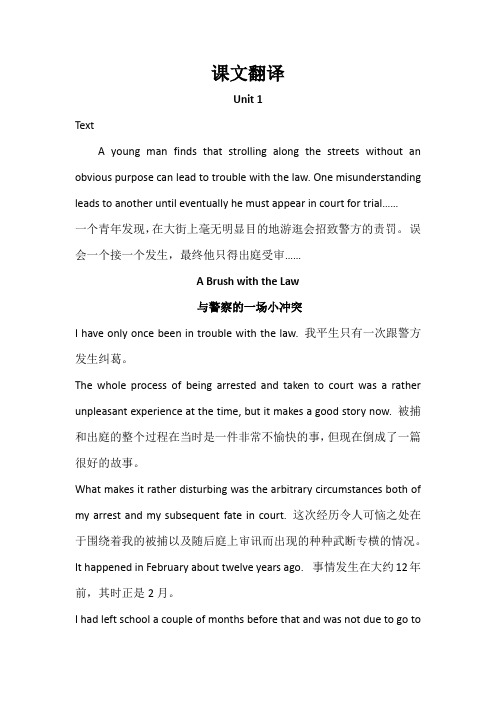
课文翻译Unit 1TextA young man finds that strolling along the streets without an obvious purpose can lead to trouble with the law. One misunderstanding leads to another until eventually he must appear in court for trial……一个青年发现,在大街上毫无明显目的地游逛会招致警方的责罚。
误会一个接一个发生,最终他只得出庭受审……A Brush with the Law与警察的一场小冲突I have only once been in trouble with the law. 我平生只有一次跟警方发生纠葛。
The whole process of being arrested and taken to court was a rather unpleasant experience at the time, but it makes a good story now. 被捕和出庭的整个过程在当时是一件非常不愉快的事,但现在倒成了一篇很好的故事。
What makes it rather disturbing was the arbitrary circumstances both of my arrest and my subsequent fate in court. 这次经历令人可恼之处在于围绕着我的被捕以及随后庭上审讯而出现的种种武断专横的情况。
It happened in February about twelve years ago. 事情发生在大约12年前,其时正是2月。
I had left school a couple of months before that and was not due to go touniversity until the following October. 几个月前我中学毕业了,但上大学要等到10月。
大学英语精读(第三版)课文原文
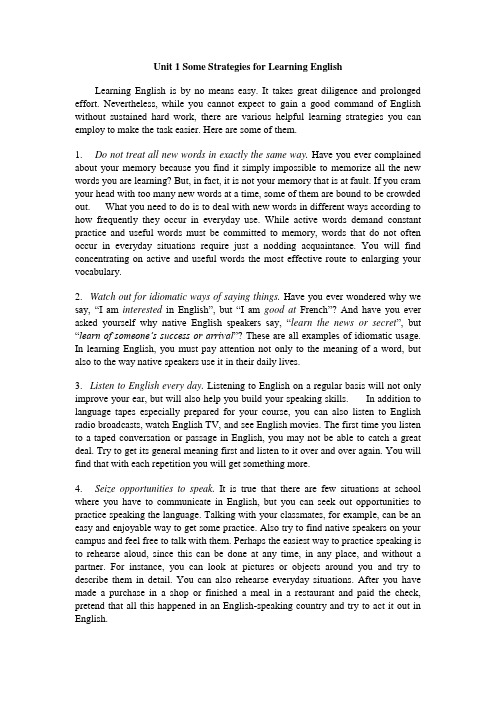
Unit 1 Some Strategies for Learning EnglishLearning English is by no means easy. It takes great diligence and prolonged effort. Nevertheless, while you cannot expect to gain a good command of English without sustained hard work, there are various helpful learning strategies you can employ to make the task easier. Here are some of them.1. Do not treat all new words in exactly the same way. Have you ever complained about your memory because you find it simply impossible to memorize all the new words you are learning? But, in fact, it is not your memory that is at fault. If you cram your head with too many new words at a time, some of them are bound to be crowded out. What you need to do is to deal with new words in different ways according to how frequently they occur in everyday use. While active words demand constant practice and useful words must be committed to memory, words that do not often occur in everyday situations require just a nodding acquaintance. You will find concentrating on active and useful words the most effective route to enlarging your vocabulary.2. Watch out for idiomatic ways of saying things. Have you ever wondered why we say, “I am interested in English”, but “I am good at French”? And have you ever asked yourself why nati ve English speakers say, “learn the news or secret”, but “learn of someone’s success or arrival”? These are all examples of idiomatic usage. In learning English, you must pay attention not only to the meaning of a word, but also to the way native speakers use it in their daily lives.3. Listen to English every day. Listening to English on a regular basis will not only improve your ear, but will also help you build your speaking skills. In addition to language tapes especially prepared for your course, you can also listen to English radio broadcasts, watch English TV, and see English movies. The first time you listen to a taped conversation or passage in English, you may not be able to catch a great deal. Try to get its general meaning first and listen to it over and over again. You will find that with each repetition you will get something more.4. Seize opportunities to speak.It is true that there are few situations at school where you have to communicate in English, but you can seek out opportunities to practice speaking the language. Talking with your classmates, for example, can be an easy and enjoyable way to get some practice. Also try to find native speakers on your campus and feel free to talk with them. Perhaps the easiest way to practice speaking is to rehearse aloud, since this can be done at any time, in any place, and without a partner. For instance, you can look at pictures or objects around you and try to describe them in detail. You can also rehearse everyday situations. After you have made a purchase in a shop or finished a meal in a restaurant and paid the check, pretend that all this happened in an English-speaking country and try to act it out in English.5. Read widely.It is important to read widely because in our learning environment, reading is the main and most reliable source of language input. When you choose reading materials, look for things that you find interesting, that you can understand without relying too much on a dictionary. A page a day is a good way to start. As you go on, you will find that you can do more pages a day and handle materials at a higher level of difficulty.6. Write regularly. Writing is a good way to practice what you already know. Apart from compositions assigned by your teacher, you may find your own reasons for writing. A pen pal provides good motivation; you will learn a lot by trying to communicate with someone who shares your interests, but comes from a different culture. Other ways to write regularly include keeping a diary, writing a short story and summarizing the daily news.Language learning is a process of accumulation. It pays to absorb as much as you can from reading and listening and then try to put what you have learned into practice through speaking and writing.Unit 2 Sailing Round the WorldBefore he sailed round the world single-handed, Francis Chichester had already surprised his friends several times. He had tried to fly round the world but failed. That was in 1931.The years passed. He gave up flying and began sailing. He enjoyed it greatly. Chichester was already 58 years old when he won the first solo transatlantic sailing race. His old dream of going round the world came back, but this time he would sail. His friends and doctors did not think he could do it, as he had lung cancer. But Chichester was determined to carry out his plan. In August, 1963, at the age of nearly sixty-five, an age when many men retire, he began the greatest voyage of his life. Soon, he was away in this new 16-metre boat, Gipsy Moth.Chichester followed the route of the great nineteenth century clipper ships. But the clippers had had plenty of crew. Chicheater did it all by himself, even after the main steering device had been damaged by gales. Chichester covered 14, 100 miles before stopping in Sydney, Australia. This was more than twice the distance anyone hadpreviously sailed alone.He arrived in Australia on 12 December, just 107 days out from England. He received a warm welcome from the Australians and from his family who had flown there to meet him. On shore, Chichester could not walk without help. Everybody said the same thing: he had done enough; he must not go any further. But he did not listen.After resting in Sydney for a few weeks, Chichester set off once more in spite of his friends' attempts to dissuade him. The second half of his voyage was by far the more dangerous part, during which he sailed round the treacherous Cape Horn.On 29 January he left Australia. The next night, the blackest he had ever known, the sea became so rough that the boat almost turned over. Food, clothes, and broken glass were all mixed together. Fortunately, bed and went to sleep. When he woke up, the sea had become calm the nearest person he could contact by radio, unless there was a ship nearby, Wild be on an island 885 miles away.After succeeding in sailing round Cape Horn, Chichester sent the following radio message to London:" I feel as if I had wakened from a nightmare. Wild horses could not drag me down to Cape Horn and that sinister Southern Ocean again."Just before 9 o'clock on Sunday evening 28 May, 1967, he arrived back in England, where a quarter of a million people were waiting to welcome him. Queen Elizabeth II knighted him with the very sword that Queen Elizabeth I had sailed round the world for the first time. The whole voyage from England and back had covered 28, 500 miles. It had taken him nine months, of which the sailing time was 226 days. He had done what he wanted to accomplish.Like many other adventurers, Chichester had experienced fear and conquered it. In doing so, he had undoubtedly learnt something about himself. Moreover, in the modern age when human beings depend so much on machines, he had given men throughout the world new pride.Unit 3 The PresentIt was the old lady's birthday.She got up early to be ready for the post. From the second floor flat she could see the postman when he came down the street, and the little boy from the ground floor brought up her letters on the rare occasions when anything came.Today she was sure the would be something. Myra wouldn't forget her mother's birthday, even if she seldom wrote at other times. Of course Myra was busy. Her husband had been made Mayor, and Myra herself had got a medal for her work the aged.The old lady was proud of Myra, but Enid was the daughter she loved. Enid had never married, but had seemed content to live with her mother, and teach in a primary school round the corner.One evening, however, Enid said, "I've arranged for Mrs. Morrison to look after you for a few days, Mother. Tomorrow I have to go into hospital--just a minor operation, I'll soon be home."In the morning she went, but never came back--she died on the operating table. Myra came to the funeral, and in her efficient way arranged for Mrs. Morrison to come in and light the fire and give the old lady her breakfast.Two years ago that was, and since then Myra had been to see her mother three times, but her husband never.The old lady was eight today. She had put on her best dress. Perhaps--perhaps Myra might come. After all, eighty was a special birthday, another decade lined or endured just as you chose to look at it.Even if Myra did not come, she would send a present. The old lady was sure of that. Two spots of colour brightened her cheeks. She was excited--like a child. She would enjoy her day.Yesterday Mrs. Morrison had given the flat an extra clean, and today she had brought a card and a bunch of marigolds when she came to do the breakfast. Mrs. Grant downstairs had made a cake, and in the afternoon she was going down there to tea. The little boy, Johnnie, had been up with a packet of mints, and said he wouldn't go out to play until the post had come."I guess you'll get lots and lots of presents," he said, "I did last were when I was six."What would she like? A pair of slippers perhaps. Or a new cardigan. A cardigan would be lovely. Blue's such a pretty colour. Jim had always liked her in blue. Or a table lamp. Or a book, a travel book, with pictures, or a little clock, with clear black numbers. So many lovely things.She stood by the window, watching. The postman turned round the corner on his bicycle. Her heart beat fast. Johnnie had seen him too and ran to the gate.Then clatter, clatter up the stairs. Johnnie knocked at her door."Granny, granny," he shouted, "I've got your post."He gave her four envelopes. Three were unsealed cards from old friends. The fourth was sealed, in Myra's writing. The old lady felt a pang of disappointment."No parcel, Johnnie?""No, granny."Maybe the parcel was too large to come by letter post. That was it. It would come later by parcel post. She must be patient.Almost reluctantly she tore the envelope open. Folded in the card was a piece of paper. Written on the card was a message under the printed Happy Birthday -- Buy yourself something nice with the cheque, Myra and Harold.The cheque fluttered to the floor like a bird with a broken wing. Slowly the old lady stooped to pick it up. Her present, her lovely present. With trembling fingers she tore it into little bits.Unit 4 Turning off TV: a Quiet HourI would like to propose that for sixty to ninety minutes each evening, right after the early evening news, all television broadcasting in the United States be prohibited by law.Let us take a serious, reasonable look at what the results be if such a proposal were accepted. Families might use the time for a real family hour. Without the distraction of TV, they might sit around together after dinner and actually talk to one another. It is well known that many of our problems -- everything, in fact, from the generation gap to the high divorce rate to some forms of mental illness -- are caused at least in part by failure to communicate. We do not tell each other what is disturbing us. The result is emotional difficulty of one kind or another. By using the quiet family hour to discuss our problems, we might get to know each other better, and to like each other better.On evenings when such talk is unnecessary, families could rediscover more active pastimes. Freed from TV, forced to find their own activities, they might take a ride together to watch the sunset. Or they might take a walk together (remember feet?) and see the neighborhood with fresh, new eyes.With free time and no TV, children and adults might rediscover reading. There is more entertainment in a good book than in a month of typical TV programming. Educators report that the generation growing up with television can barely write an English sentence, even at the college level. Writing is often learned from reading. A more literate new generation could be a product of the quiet hour.A different form of reading might also be done, as it was in the past: reading aloud. Few pastimes bring a family closer together than gathering around and listening to mother or father read a good story. The quiet hour could become the story hour. When the quiet hour ends, the TV networks might even be forced to come up with better shows in order to get us back from our newly discovered activities.At first glance, the idea of an hour without TV seems radical. What will parents do without the electronic baby-sitter? How will we spend the time? But it is not radical at all. It has been only twenty-five years since television came to control American free time. Those of us thirty-five and older can remember childhoods without television, spent partly with radio -- which at least involved the listener's imagination -- but also with reading, learning, talking, playing games, inventing new activities. It wasn't that difficult. Honest. The truth is we had a ball.Unit 5 I never write rightWhen I was 15, I announced to my English class that I was going to write and illustrate my own books. Half the students sneered; the rest nearly fell out of their chairs laughing."Don't be silly. Only geniuses can become writers," the English teacher saidsmugly. "And you are getting a D this semester."I was so humiliated I burst into tears. That night I wrote a short, sad poem about broken dreams and mailed it to the Capper's Weekly newspaper. To my astonishment they published it, and sent me two dollars. I was a published and paid writer! I showed my teacher and fellow students. They laughed."Just plain dumb luck," the teacher said.I'd tasted success. I'd sold the first thing I'd ever written. That was more than any of them had done, and if it was "just dumb luck," that was fine with me.During the next two years I sold dozens of poems, letters, jokes and recipes. By the time I graduated from high school (with a C-minus average), I had scrapbooks filled with my published work. I never mentioned my writing to my teachers, friends or my family again. They were dream killers, and if people must choose between their friends and their dreams, they must always choose their dreams.But sometimes you do find a friend who supports your dreams. "It's easy to write a book," that new friend told me. "You can do it.""I don't know if I'm smart enough," I said, suddenly feeling 15 again and hearing echoes of laughter."Nonsense!" she said. "Anyone can write a book if they want to."I had four children at the time, and the oldest was only four. We lived on a goat farm in Oklahoma, miles from anyone. All I had to do each day was take care of four kids, milk goats, and do the cooking, laundry and gardening. No problem.While the children napped, I typed on my ancient typewriter. I wrote what I felt. It took nine months, just like a baby.I chose a publisher at random and put the manuscript in an empty Pampers diapers package, the only box I could find (I'd never heard of manuscript boxes). The letter Ienclosed read: "I wrote this book myself, I hope you like it. I also drew the illustrations. Chapters 6 and 12 are my favorites. Thank you."I tied a string around the diaper box and mailed it without a self-addressed stamped envelope, and without making a copy of the manuscript. A month later I received a contract, an advance on royalties and a request to start working on another book.Crying Wind became a bestseller, was translated into 15 languages and Braille, and sold worldwide. I appeared on TV talk shows during the day and changed diapers at night. I traveled from New York to California and Canada on promotional tours. My first book also became required reading in Native American schools in Canada.It took six months to write my next book. I mailed it in an empty Uncle Wiggley game box (I still hadn't heard of manuscript boxes). My Searching Heart also became a bestseller. I wrote my next novel, When I Give My Heart, in only three weeks.The worst year I ever had as a writer, I earned two dollars (I was 15, remember?). In my best year, I earned $36,000. Most years I earn between $5,000 and $10,000. No, it isn't enough to live on, but it's still more than I'd make working part-time, and it's $5,000 to $10,000 more than I'd make if I didn't write at all.People ask what college I attended, what degrees I have, and what qualifications I have to be a writer. The answer is none. I just write. I'm not a genius, I'm not gifted and I don't write right. I'm lazy, undisciplined, and spend more time with my children and friends than I do writing.I didn't own a thesaurus until four years ago and I use a small Webster's dictionary that I bought at Kmart for 89 cents. I use an electric typewriter that I paid $129 for six years ago. I've never used a word processor. I do all the cooking, cleaning andlaundry for a family of six and fit my writing in a few minutes here and there. I write everything in longhand on yellow tablets while sitting on the sofa with my four kids, eating pizza and watching TV. When the book is finished, I type it and mail it to the publisher.I've written eight books. Four have been published, and three are still out with the publishers. One stinks.To all those who dream of writing, I'm shouting at you, "Yes, you can! Yes, you can! Don't listen to them!" I don't write right, but I've beaten the odds. Writing is easy, it's fun, and anyone can do it. Of course, a little dumb luck doesn't hurt.Unit 6 Sam Adams, Industrial EngineerIf you ask my mother how I happened to become an industrial engineer, she'll tell you that I have always been one.She means that I have always wanted everything to be well organized and neat. When I was still in elementary school, I liked to keep my socks in the upper left-hand drawer of my bureau, my underwear in the upper right drawer, shirts in the middle drawer, and pants, neatly folded, in the bottom drawer.In fact, I was the efficiency expert for the whole family. I used to organize my father's tools, my mother's kitchen utensils, my sister's boyfriends.I needed to be efficient. I wanted to be well organized. For me, there was a place for everything and everything was always in its place. These qualities gave me a good foundation for a career in industrial engineering.Unfortunately, I was also a bit bossy and I wasn't a very good listener. You'll see what I mean when I tell you about the first project I ever did after I finished my bachelor's degree at the university.After graduation I returned home to my small town in Indiana. I didn't have a job yet. Mr. Hobbs, a friend of my father's, owned a small shirt factory in town. Withinthe past five years it had grown from twenty to eighty workers. Mr. Hobbs was worried that his plant was getting too big and inefficient, so he asked me to come in on a short-term basis as a consultant.I went to the plant and spent about a week looking around and making notes. I was really amazed at what I saw.Most curious of all, there was no quality control whatsoever. No one inspected the final product of the factory. As a result some of the shirts that were put in boxes for shipment were missing one or two buttons, the collar, even a sleeve sometimes!The working conditions were poor. The tables where the workers sat were very high and uncomfortable. Except for a half hour at lunchtime, there were no breaks in the day to relieve the boring work. There was no music. The walls of the workrooms were a dull gray color. I was amazed that the workers hadn't gone on strike.Furthermore, the work flow was irregular. There was one especially absent-minded young man in the assembly line who sewed on buttons. After a while I recognized him as "Big Jim," who used to sit behind me in math class in high school. He was very slow and all the shifts were held up at his position. Workers beyond him in line on his shift had to wait with nothing to do; therefore, a great deal of time and efficiency were lost as Big Jim daydreamed while he worked. All week I wondered why he wasn't fired.After I made observations for a week, Mr. Hobbs asked me for an oral report of my findings. I covered my major points by telling him the following: "If you have a quality control inspection, you will greatly improve your finished product.""If the assembly line is redesigned, a smooth work flow can be achieved and time and energy can be saved.""If you decrease the height of the worktables, the machine operators will work more comfortably.""If the management provides pleasant background music and beautifies the dull setting, the factory will be much more productive.""If the workers have a fifteen-minute coffee break in the morning and afternoon,they will be more efficient.""If excellent work results in frequent pay increases or promotions, the workers will have greater incentive to produce."Mr. Hobbs thanked me for this report and told me he would talk over my suggestions with his brother, the co-owner and manager of the factory. "We're interested in progress here," he said. "We want to keep up with the times."He also gave me a check for $ 100 and a box of shirts with his compliments.Unit 7 The SamplerIn a certain store where they sell puddings, a number of these delicious things are laid out in a row during the Christmas season. Here you may select the one which is most to your taste, and you are even allowed to sample them before coming to a decision.I have often wondered whether some people, who had no intention of making a purchase, would take advantage of this privilege. One day I asked this question of the shop girl, and I learned it was indeed the case."Now there's one old gentleman, for instance," she told me, "he comes here almost every week and samples each one of the puddings, though he never buys anything, and I suspect he never will. I remember him from last year before that, too. Well, let him come if he wants it, and welcome to it. And what's more, I hope there are a lot more stores where he can go and get his share. He looks as if he needed it all right, and I suppose they can afford it."She was still speaking when an elderly gentleman limped up to the counter and began looking closely at the row of puddings with great interest."Why, that's the very gentleman I've been telling you about," whispered the shop girl." Just watch him now." And then turning to him:" Would you like to sample them, sir? Here's spoon for you to use."The elderly gentleman, who was poorly but neatly dressed, accepted the spoon and began eagerly to sample one after another of the puddings, only braking off occasionally to wipe his red eyes with a large torn handkerchief."This is quite good.""This is not bad either, but a little too heavy."All the time it was quite evident that he sincerely believed that he might eventually buy one of these puddings, and I am positive that he did not for a moment feel that he was in any way cheating the store. Poor old chap! Probably he had come down in the world and this sampling was all that was left him from the time when he could afford to come and select his favorite pudding.Amidst the crowd of happy, prosperous looking Christmas shoppers, the little black figure of the old man seemed pitiful and out of place, and in a burst of benevolence, I went up to him and said:"Pardon me, sir, will you do me a favor? Let me purchase you one of these puddings. It would give me such pleasure."He jumped back as if he had been stung, and the blood rushed into his wrinkled face."Excuse me," he said, with more dignity than I would have thought possible considering his appearance, "I do not believe I have the pleasure of knowing you. Undoubtedly you have mistaken me for someone else." And with a quick decision he turned to the shop girl and said in a loud voice, "Kindly pack me up this one here. Iwill take it with me." He pointed at one of the largest and most expensive of the puddings.The girl took down the pudding from its stand and started to make a parcel of it, while he pulled out a worn little black pocketbook and began counting out shillings and pennies on to the counter. To save his "honour" he had been forced into a purchase which he could not possibly afford. How I longed for the power to unsay my tactless words! It was too late though, and I felt that the kindest thing I could do now would be walk away."You pay at the desk," the shop girl was telling him, but he did not seem to understand and kept trying to put the coins into her hand. And that was the last I saw or the old man. Now he can never go there to sample pudding any more.Unit 8 A Magician at Stretching a Dollar1.That December, with Christmas approaching, she was out at workand Doris was in the kitchen when I let myself into her bedroom one afternoon in search of a safety pin. Since her bedroom opened onto a community hallway, she kept the door locked, but needing the pin, I took the key from its hiking place, unlocked the door and stepped in.Standing against the wall was a big, black bicycle with balloon tires. I recognized it instantly. It was the same second-hand bike I'd beenadmiring in a Baltimore Street shop window. I'd even asked about the price. It was a shock. Something like $15. Somehow my mother had scraped together enough for a down payment and meant to surprise me with the bicycle on Christmas morning.2.I was deeply moved by the discovery and yet sickened by theknowledge that, bursting into her room like this, I had robbed her of the pleasure of seeing me astonished and delighted on Christmas day. I hadn't wanted to know her lovely secret; still coming upon it like this made me feel as though I'd struck a blow against her happiness. Ibacked out, put the key back in its hiding place, and thought over whatto do.3.I decided that between now and Christmas I must do nothing,absolutely nothing, to reveal the slightest hint of my terribleknowledge. I must avoid the least word that night reveal mypossession of her secret. Nothing must deny her the happiness ofseeing me completely amazed on Christmas day.4.In the privacy of my bedroom I began composing and testingexclamations of delight: “Wow!” “A bike with ballo on tires! I don't believe it!” “I'm the luckiest boy alive!” And so on. They all owed a lot to movies in which boys like Mickey Rooney had seen their wildest dreams come true. I soon realized that, with my lack of acting talent, all of them were going to sound false at the critical moment when I wanted to cry out my love spontaneously from the heart. Maybe it would be better to say nothing but appear to be shocked into such deep pleasure that speech had escaped me/ I wasn't sure, though. I'd seen speechless gratitude in the movies too, and it never really worked until the actors managed to cry a few quiet tears. I doubted I could cry on cue, so I began thinking about other expressions of speechlessamazement. In front of a hand-held mirror in my bedroom I tried the whole range of expressions; mouth open and eyes wide; hands slapped firmly against both cheeks to keep the jaw from falling off; ear-to-ear grin with all teeth fully exposed while hugging myself with both arms.These and more I practiced for several days without acquiringconfidence in any of them. I decided to wait until Christmas morning and see if anything came naturally...5.That Christmas morning she woke up early, “to see what SantaClaus brought,” she said with just the right tone of voice to indicate we were all old enough to know who Santa Claus was. I came out of my bedroom with my present for her and Doris, and Doris came with hers. My mother's has been placed under the tree during the night.There were a few small brightly wrapped packages, a big doll forDoris, but no bicycle. I must have looked disappointed.6.“It looks like Santa Claus didn't do too well by you this year,Buddy,” she said, as I opened packages. A shirt. A necktie. I said。
大学英语精读第三册英语课文翻译

Uint 5A mother and her son learn more from a moment of defeat than they ever could from a victory. Her example of never giving up gives him courage for the rest of his life.从失败的一刻中,母亲和儿子收获了他们从成功中不曾收获到的。
母亲永不放弃的精神给他此后的人生以很大的勇气Coming home from school that dark winter's day so long ago, I was filled with anticipation.I had a new issue of my favorite sports magazine tucked under my arm, and the house to myself. Dad was at work, my sister was away, and Mother wouldn't be home from her new job for an hour. I bounded up the steps, burst into the living room and flipped on a light. 在很久以前一个昏暗的冬天,我放学回家,心中充满了期待。
我腋下夹着一期新的我最爱看的体育杂志,再者,家里没有别人打扰我。
爸爸在上班,妹妹不在家。
妈妈刚找到新工作,还得过一个小时才下班。
我跳上台阶,冲进起居室,啪嗒一声打开电灯。
I was shocked into stillness by what I saw. Mother, pulled into a tight ball with her facein her hands, sat at the far end of the couch.She was crying. I had never seen her cry.我被眼前的景象惊呆了。
大学英语精读第三版第三册课文翻译
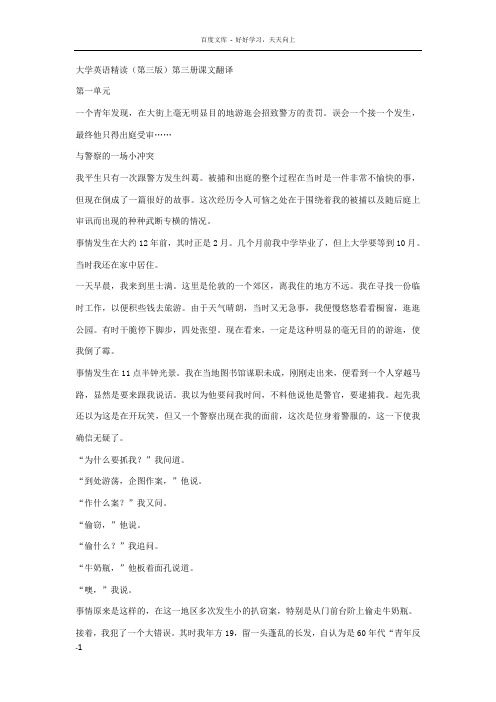
大学英语精读(第三版)第三册课文翻译第一单元一个青年发现,在大街上毫无明显目的地游逛会招致警方的责罚。
误会一个接一个发生,最终他只得出庭受审……与警察的一场小冲突我平生只有一次跟警方发生纠葛。
被捕和出庭的整个过程在当时是一件非常不愉快的事,但现在倒成了一篇很好的故事。
这次经历令人可恼之处在于围绕着我的被捕以及随后庭上审讯而出现的种种武断专横的情况。
事情发生在大约12年前,其时正是2月。
几个月前我中学毕业了,但上大学要等到10月。
当时我还在家中居住。
一天早晨,我来到里士满。
这里是伦敦的一个郊区,离我住的地方不远。
我在寻找一份临时工作,以便积些钱去旅游。
由于天气晴朗,当时又无急事,我便慢悠悠看看橱窗,逛逛公园。
有时干脆停下脚步,四处张望。
现在看来,一定是这种明显的毫无目的的游逛,使我倒了霉。
事情发生在11点半钟光景。
我在当地图书馆谋职未成,刚刚走出来,便看到一个人穿越马路,显然是要来跟我说话。
我以为他要问我时间,不料他说他是警官,要逮捕我。
起先我还以为这是在开玩笑,但又一个警察出现在我的面前,这次是位身着警服的,这一下使我确信无疑了。
“为什么要抓我?”我问道。
“到处游荡,企图作案,”他说。
“作什么案?”我又问。
“偷窃,”他说。
“偷什么?”我追问。
“牛奶瓶,”他板着面孔说道。
“噢,”我说。
事情原来是这样的,在这一地区多次发生小的扒窃案,特别是从门前台阶上偷走牛奶瓶。
接着,我犯了一个大错误。
其时我年方19,留一头蓬乱的长发,自认为是60年代“青年反主流文化”的一员。
所以我想装出一副冷漠的、对这一事件满不在乎的样子。
于是我尽量用一种漫不经心的极其随便的腔调说,“你们跟踪我多久啦?”这样一来,在他们眼里,我就像是非常熟悉这一套的了,也使他们更加确信我是一个地地道道的坏蛋。
几分钟后,开来了一辆警车。
“坐到后面去,”他们说。
“把手放到前排座位的靠背上,不准挪动。
”他们分别坐在我的两边。
这可再也不是闹着玩的了。
在警察局,他们审讯了我好几个小时。
大学英语精读第三版第三册阅读理解翻译

几年前,我花了一整天在新泽西州一所小学。
这是一个很好的学校,平均一个正方形和坚实的建筑,充满了合理的来自中产阶级家庭的孩子,我处理三个类,和我交错出门的时候我想躺下休息。
教学的最艰难的工作。
在他的新回忆录,“老师,”弗兰克•麦考特回忆说告诉他的学生,“教学是比在码头和仓库”。
更不用说写专栏了。
我可以用我的下巴凝视进中间的距离(下巴)在我的手。
但你精神上南走五分钟前的五年级学生,和你沉没。
新老师今天让平均每年不到30000美元,这可能看起来不太坏的二十几岁的年轻人没有抵押贷款(抵押贷款)和没有孩子。
但很快新教师意识到他们可以赚更多的钱,而不是工作接近其他地方一样硬。
一生的听证会后老传说轻松(舒适安逸的)小时,暑假,他们指出,早期的早晨是学生需要额外的帮助,晚上是为测试修正和教案,和周末和萨默斯是第二个,甚至第三个工作去支付账单。
根据教育部,每五个老师离开后第一年,而且几乎两倍在三个之内离开。
如果任何业务,周转率,有人会做一些聪明的和战略来修复它。
这不是任何业务。
这是最重要的业务,人类的景观的园丁。
不幸的是,当前教育的解决问题的方式是直接取自商业实践,这是一种糟糕的健康。
而不是简单地承认,可悲的是起薪低且致力于增加他们,找到钱合理重复提出,政客们已经浪费了几十年谈论所谓绩效工资(奖励工资)。
这是一个概念,这一规定发挥的作用很好如果你制作玩具,但是孩子不是玩具,和良好的教学不是一个生产线。
26。
第一段,我们能从中推断出什么老师?D 他们有一个非常困难的工作要做。
27,为什么作者说教学是比写专栏吗?B 教学要求充分重视。
28。
新老师发现后一些练习什么?D 他们可以接受第二个甚至第三个工作除了教学。
29。
我们可以推断出从第四段作者认为A 应采取措施使教师在他们的工作30。
作者认为绩效工资什么?D 它是不适合教学工作。
我出生残疾,影响了我的平衡感,让我跛行。
它不仅影响腿的功能,但它也有一个对肾脏的影响。
残疾起伏了。
大学英语精读第三册课文翻译
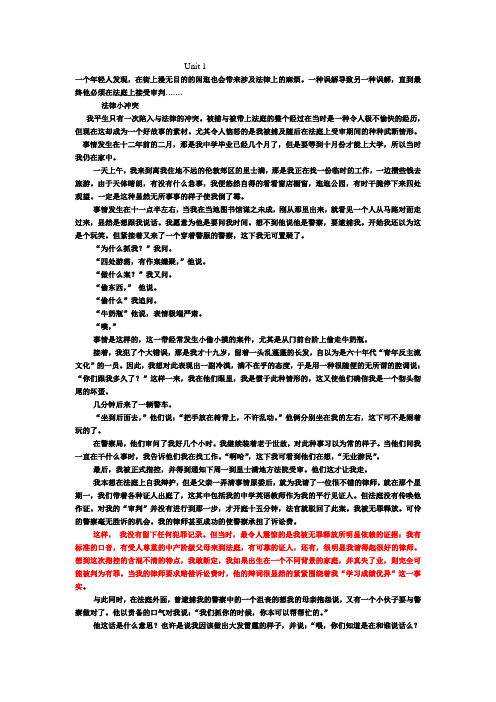
Unit 1一个年轻人发现,在街上漫无目的的闲逛也会带来涉及法律上的麻烦。
一种误解导致另一种误解,直到最终他必须在法庭上接受审判…….法律小冲突我平生只有一次陷入与法律的冲突。
被捕与被带上法庭的整个经过在当时是一种令人极不愉快的经历,但现在这却成为一个好故事的素材。
尤其令人恼怒的是我被捕及随后在法庭上受审期间的种种武断情形。
事情发生在十二年前的二月,那是我中学毕业已经几个月了,但是要等到十月份才能上大学,所以当时我仍在家中。
一天上午,我来到离我住地不远的伦敦郊区的里士满,那是我正在找一份临时的工作,一边攒些钱去旅游。
由于天体晴朗,有没有什么急事,我便悠然自得的看看窗店橱窗,逛逛公园,有时干脆停下来四处观望。
一定是这种显然无所事事的样子使我倒了霉。
事情发生在十一点半左右,当我在当地图书馆谋之未成,刚从那里出来,就看见一个人从马路对面走过来,显然是想跟我说话。
我愿意为他是要问我时间。
想不到他说他是警察,要逮捕我。
开始我还以为这是个玩笑。
但紧接着又来了一个穿着警服的警察,这下我无可置疑了。
“为什么抓我?”我问。
“四处游荡,有作案嫌疑,”他说。
“做什么案?”我又问。
“偷东西,”他说。
“偷什么”我追问。
“牛奶瓶”他说,表情极端严肃。
“噢,”事情是这样的,这一带经常发生小偷小摸的案件,尤其是从门前台阶上偷走牛奶瓶。
接着,我犯了个大错误,那是我才十九岁,留着一头乱蓬蓬的长发,自以为是六十年代“青年反主流文化”的一员。
因此,我想对此表现出一副冷漠,满不在乎的态度,于是用一种很随便的无所谓的腔调说:“你们跟我多久了?”这样一来,我在他们眼里,我是惯于此种情形的,这又使他们确信我是一个彻头彻尾的坏蛋。
几分钟后来了一辆警车。
“坐到后面去,”他们说:“把手放在椅背上,不许乱动。
”他俩分别坐在我的左右,这下可不是闹着玩的了。
在警察局,他们审问了我好几个小时。
我继续装着老于世故,对此种事习以为常的样子。
当他们问我一直在干什么事时,我告诉他们我在找工作。
大学英语精读第三版第三册unit1-unit3课文翻译
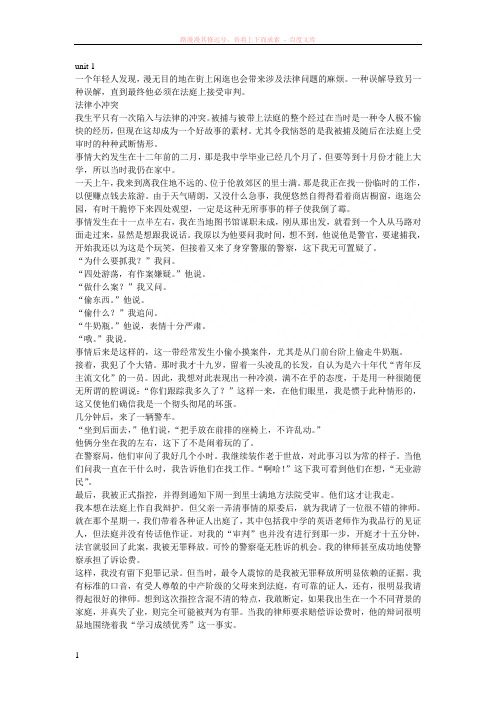
“为什么要抓我?”我问。
“四处游荡,有作案嫌疑。”他说。
“做什么案?”我又问。
学生们必须上网。你们家必须用数码与环球信息网联通。企业必须能即时下载大量资料。但是,除非我们改变范式、重新审视相关的各种因素,否则,信息高速公路就不会给我们带来什么结果。
无论是现在还是最近,我们都不缺乏信息。试想我们拥有的信息比四面年前的哥白尼多了多少。但他作出了足以震撼全球的(权作双关语)惊人之举,完全改变了人们对宇宙的看法。他作出此举不是靠发现更多的信息,而是靠用不同的眼光看大家都看到过的信息。爱德华·詹纳不是靠积累信息发明了预防药物,而是靠重新表述问题。
我本想在法庭上作自我辩护。但父亲一弄清事情的原委后,就为我请了一位很不错的律师。就在那个星期一,我们带着各种证人出庭了,其中包括我中学的英语老师作为我品行的见证人,但法庭并没有传话他作证。对我的“审判”也并没有进行到那一步,开庭才十五分钟,法官就驳回了此案,我被无罪释放。可怜的警察毫无胜诉的机会。我的律师甚至成功地使警察承担了诉讼费。
几分钟后,来了一辆警车。
“坐到后面去,”他们说,“把手放在前排的座椅上,不许乱动。”
他俩分坐在我的左右,这下了不是闹着玩的了。
在警察局,他们审问了我好几个小时。我继续装作老于世故,对此事习以为常的样子。当他们问我一直在干什么时,我告诉他们在找工作。“啊哈!”这下我可看到他们在想,“无业游民”。
最后,我被正式指控,并得到通知下周一到里士满地方法院受审。他们这才让我走。
外教社大学英语精读第三册unit3原文+翻译+课后翻译

Unit 3一、课文Every teacher probably asks himself time and again: Why am I a teacher? Do the rewards of teaching outweigh the trying moments? Answering these questions is not a simple task. Let's see what the author says.也许每位教师都一再问过自己:为什么选择教书作为自己的职业?教书得到的回报是否使老师的烦恼显得不值得多谈?回答这些问题并非易事。
让我们看看本文的作者说了些什么。
Why I TeachPeter G. BeidlerWhy do you teach? My friend asked the question when I told him that I didn't want to be considered for an administrative position. He was puzzled that I did not want what was obviously a "step up" toward what all Americans are taught to want when they grow up: money and power.我为什么当教师彼得·G·贝德勒你为什么要教书呢? 当我告诉一位朋友我不想谋求行政职务时,他便向我提出这一问题。
所有美国人受的教育是长大成人后应该追求金钱和权力,而我却偏偏不要明明是朝这个目标“迈进”的工作,他为之大惑不解。
Certainly I don't teach because teaching is easy for me. Teaching is the most difficult of the various ways I have attempted to earn my living: mechanic, carpenter, writer. For me, teaching is a red-eye, sweaty-palm, sinking-stomach profession. Red-eye, because I never feel ready to teach no matter how late I stay up preparing. Sweaty-palm, because I'm always nervous before I enter the classroom, sure that I will be found out for the fool that I am. Sinking-stomach, because I leave the classroom an hour later convinced that I was even more boring than usual.当然,我之所以教书不是因为我觉得教书轻松。
大学英语精读3双语版 (3)

So teaching gives me pace,and variety ,and challenge,and the opportunity to keep on learning.
所以说,教学使我的工作进程有了规律,使我的生活变得丰富多采,教学向我提出了挑战,也给了我不断学习的机会。
或者因为我有满腹学问,觉得非与别人分享不可。
Sometimes I am amazed that my students actually take notes on what I say in class!
有时我感到惊异,学生竟真的把我课上讲的东西做了笔记!
Why, then, do I teach?
I teach because I like to ask questions that students must struggle to answer.
我教书,是因为我喜欢向学生提出必须绞尽脑汁才能回答的问题。
The world is full of right answers to bad questions.While teaching,I sometimes find good questions.
选择教师作为职业是由于什么原因?
Do the rewards of teaching outweigh the trying moments?
是不是教书的报酬其价值超过了那难受的时刻?
Answering these questions is not a simple task.
回答这些问题不是一个简单的任务。
看到了她得悉自己的文章被采用,亲眼目睹她找到了工作并获得了在哈佛大学当研究员的职位,著书论述她在做我学生时萌发的思想。
大学英语精读第三版第三册课文翻译介绍
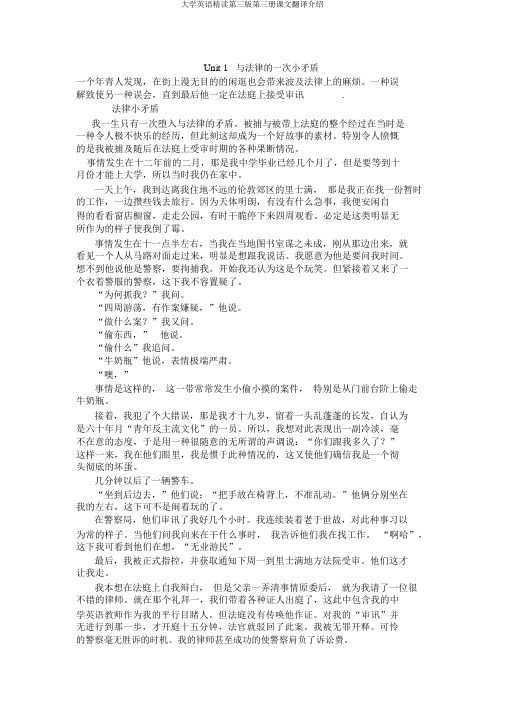
Unit 1与法律的一次小矛盾一个年青人发现,在街上漫无目的的闲逛也会带来波及法律上的麻烦。
一种误解致使另一种误会,直到最后他一定在法庭上接受审讯.法律小矛盾我一生只有一次堕入与法律的矛盾。
被捕与被带上法庭的整个经过在当时是一种令人极不快乐的经历,但此刻这却成为一个好故事的素材。
特别令人愤慨的是我被捕及随后在法庭上受审时期的各种果断情况。
事情发生在十二年前的二月,那是我中学毕业已经几个月了,但是要等到十月份才能上大学,所以当时我仍在家中。
一天上午,我到达离我住地不远的伦敦郊区的里士满,那是我正在找一份暂时的工作,一边攒些钱去旅行。
因为天体明朗,有没有什么急事,我便安闲自得的看看窗店橱窗,走走公园,有时干脆停下来四周观看。
必定是这类明显无所作为的样子使我倒了霉。
事情发生在十一点半左右,当我在当地图书室谋之未成,刚从那边出来,就看见一个人从马路对面走过来,明显是想跟我说话。
我愿意为他是要问我时间。
想不到他说他是警察,要拘捕我。
开始我还认为这是个玩笑。
但紧接着又来了一个衣着警服的警察,这下我不容置疑了。
“为何抓我?”我问。
“四周游荡,有作案嫌疑,”他说。
“做什么案?”我又问。
“偷东西,”他说。
“偷什么”我追问。
“牛奶瓶”他说,表情极端严肃。
“噢,”事情是这样的,这一带常常发生小偷小摸的案件,特别是从门前台阶上偷走牛奶瓶。
接着,我犯了个大错误,那是我才十九岁,留着一头乱蓬蓬的长发,自认为是六十年月“青年反主流文化”的一员。
所以,我想对此表现出一副冷淡,毫不在意的态度,于是用一种很随意的无所谓的声调说:“你们跟我多久了?”这样一来,我在他们眼里,我是惯于此种情况的,这又使他们确信我是一个彻头彻底的坏蛋。
几分钟以后了一辆警车。
“坐到后边去,”他们说:“把手放在椅背上,不准乱动。
”他俩分别坐在我的左右,这下可不是闹着玩的了。
在警察局,他们审讯了我好几个小时。
我连续装着老于世故,对此种事习以为常的样子。
当他们问我向来在干什么事时,我告诉他们我在找工作。
大学英语精读3翻译

大学英语精读(第三版)Unit 1Text A Brush with the LawTurn the following sentences into English, using as many of the words and phrases you have learned from the text as possible.1. 发言人(spokesman)明确表示总统在任何情况下都不会取消(cancel)这次旅行。
2. 杰克对书架上那些书一本也不了解,所以他的选择是很随意的。
3. 随后发生的那些事件再次证明了我的猜疑(suspicions)是对的。
4. 我认为我们应该鼓励中学生在暑假找临时工作。
5. 令我们吃惊的是,这位常被赞为十分正直的州长(governor)竟然是个贪官(corrupt official)。
6. 少数工人得到提升(be promoted),与此同时却有数百名工人被解雇。
7. 如果有机会,约翰也许已成为一位杰出的画家了。
(given) 8. 数小时后,有人看见那个男孩在林子里瞎转。
KEYS1.The spokesman made it clear that the President would not cancel the trip under any circumstances.2.Jack didn't know anything about any of the books on the bookshelf, so his choice was quite arbitrary.3.The subsequent events confirmed my suspicions once again.4.I think we should encourage high school students to find temporary jobs / employment during their summer holidays.5.To our surprise, the governor who had often been praised for his honesty turned out to be a corrupt official.6.A few workers were promoted, but meanwhile hundreds of workers were dismissed.7.Given the chance, John might have become an outstanding painter.8.Several hours later, the boy was found wandering around in the woods.Unit 2TextFruitful QuestionsTurn the following passage into English, using as many of the words and phrases you have learned from the text as possible.迅速方便地获得信息是很重要,但学会以新的方式看信息甚至更为重要。
大学英语精读第三册课文汉译英答案(全)
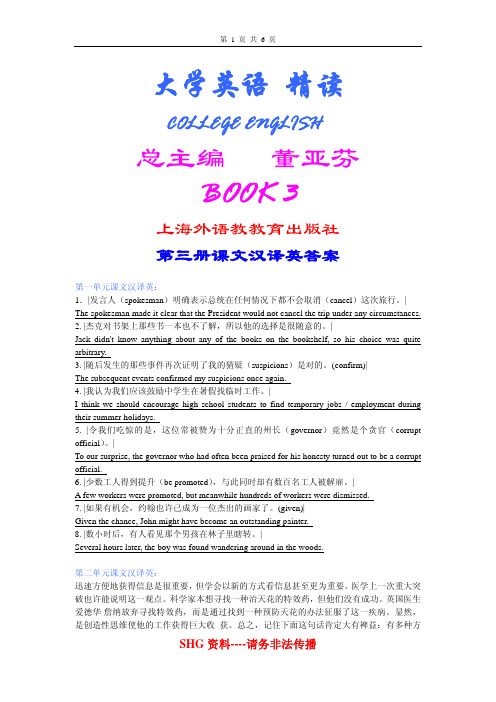
大学英语 精读COLLEGE ENGLISH总主编 董亚芬BOOK 3上海外语教教育出版社第三册课文汉译英答案第一单元课文汉译英:1.|发言人(spokesman)明确表示总统在任何情况下都不会取消(cancel)这次旅行。
| The spokesman made it clear that the President would not cancel the trip under any circumstances.2. |杰克对书架上那些书一本也不了解,所以他的选择是很随意的。
|Jack didn't know anything about any of the books on the bookshelf, so his choice was quite arbitrary.3. |随后发生的那些事件再次证明了我的猜疑(suspicions)是对的。
(confirm)|The subsequent events confirmed my suspicions once again.4. |我认为我们应该鼓励中学生在暑假找临时工作。
|I think we should encourage high school students to find temporary jobs / employment during their summer holidays.5. |令我们吃惊的是,这位常被赞为十分正直的州长(governor)竟然是个贪官(corrupt official)。
|To our surprise, the governor who had often been praised for his honesty turned out to be a corrupt official.6. |少数工人得到提升(be promoted),与此同时却有数百名工人被解雇。
|A few workers were promoted, but meanwhile hundreds of workers were dismissed.7. |如果有机会,约翰也许已成为一位杰出的画家了。
大学英语精读第三版第3册课后翻译
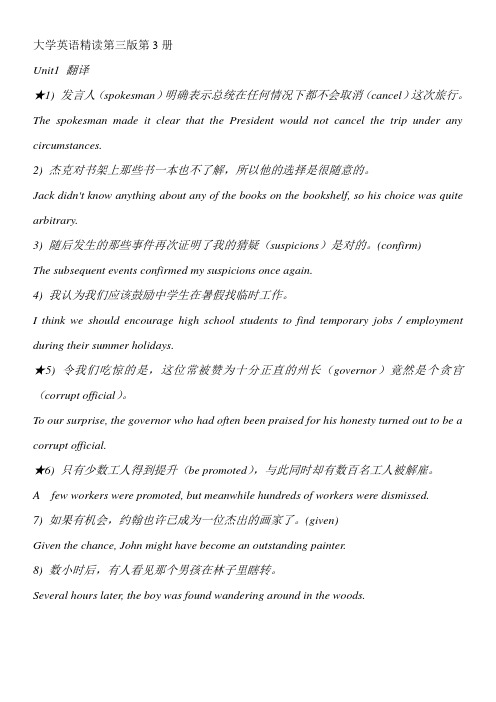
大学英语精读第三版第3册Unit1 翻译★1) 发言人(spokesman)明确表示总统在任何情况下都不会取消(cancel)这次旅行。
The spokesman made it clear that the President would not cancel the trip under any circumstances.2) 杰克对书架上那些书一本也不了解,所以他的选择是很随意的。
Jack didn't know anything about any of the books on the bookshelf, so his choice was quite arbitrary.3) 随后发生的那些事件再次证明了我的猜疑(suspicions)是对的。
(confirm)The subsequent events confirmed my suspicions once again.4) 我认为我们应该鼓励中学生在暑假找临时工作。
I think we should encourage high school students to find temporary jobs / employment during their summer holidays.★5) 令我们吃惊的是,这位常被赞为十分正直的州长(governor)竟然是个贪官(corrupt official)。
To our surprise, the governor who had often been praised for his honesty turned out to be a corrupt official.★6) 只有少数工人得到提升(be promoted),与此同时却有数百名工人被解雇。
A few workers were promoted, but meanwhile hundreds of workers were dismissed.7) 如果有机会,约翰也许已成为一位杰出的画家了。
大学英语精读第三版第三册unit1-unit3课文翻译
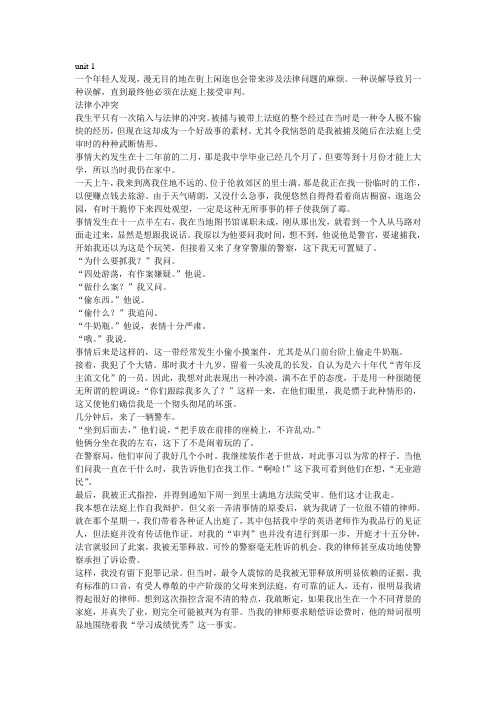
unit 1一个年轻人发现,漫无目的地在街上闲逛也会带来涉及法律问题的麻烦。
一种误解导致另一种误解,直到最终他必须在法庭上接受审判。
法律小冲突我生平只有一次陷入与法律的冲突。
被捕与被带上法庭的整个经过在当时是一种令人极不愉快的经历,但现在这却成为一个好故事的素材。
尤其令我恼怒的是我被捕及随后在法庭上受审时的种种武断情形。
事情大约发生在十二年前的二月,那是我中学毕业已经几个月了,但要等到十月份才能上大学,所以当时我仍在家中。
一天上午,我来到离我住地不远的、位于伦敦郊区的里士满。
那是我正在找一份临时的工作,以便赚点钱去旅游。
由于天气晴朗,又没什么急事,我便悠然自得得看着商店橱窗,逛逛公园,有时干脆停下来四处观望,一定是这种无所事事的样子使我倒了霉。
事情发生在十一点半左右,我在当地图书馆谋职未成,刚从那出发,就看到一个人从马路对面走过来,显然是想跟我说话。
我原以为他要问我时间,想不到,他说他是警官,要逮捕我,开始我还以为这是个玩笑,但接着又来了身穿警服的警察,这下我无可置疑了。
“为什么要抓我?”我问。
“四处游荡,有作案嫌疑。
”他说。
“做什么案?”我又问。
“偷东西。
”他说。
“偷什么?”我追问。
“牛奶瓶。
”他说,表情十分严肃。
“哦。
”我说。
事情后来是这样的,这一带经常发生小偷小摸案件,尤其是从门前台阶上偷走牛奶瓶。
接着,我犯了个大错。
那时我才十九岁,留着一头凌乱的长发,自认为是六十年代“青年反主流文化”的一员。
因此,我想对此表现出一种冷漠,满不在乎的态度,于是用一种很随便无所谓的腔调说:“你们跟踪我多久了?”这样一来,在他们眼里,我是惯于此种情形的,这又使他们确信我是一个彻头彻尾的坏蛋。
几分钟后,来了一辆警车。
“坐到后面去,”他们说,“把手放在前排的座椅上,不许乱动。
”他俩分坐在我的左右,这下了不是闹着玩的了。
在警察局,他们审问了我好几个小时。
我继续装作老于世故,对此事习以为常的样子。
当他们问我一直在干什么时,我告诉他们在找工作。
大学英语精读课程第三册(unit1-5需要背诵部分课文及翻译)
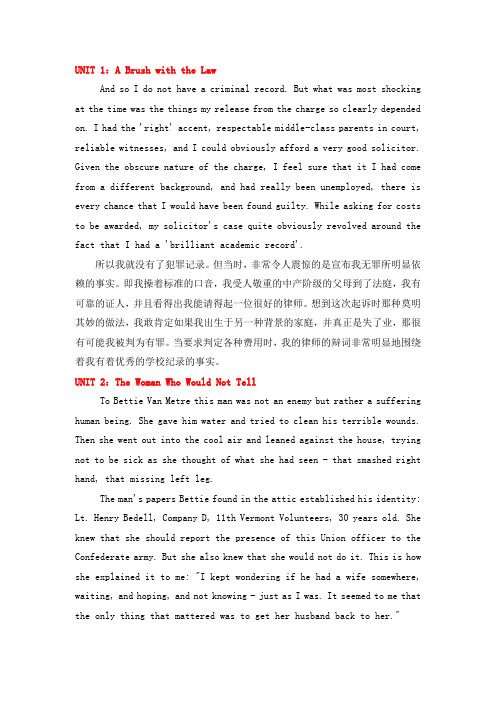
UNIT 1:A Brush with the LawAnd so I do not have a criminal record. But what was most shocking at the time was the things my release from the charge so clearly depended on. I had the 'right' accent, respectable middle-class parents in court, reliable witnesses, and I could obviously afford a very good solicitor. Given the obscure nature of the charge, I feel sure that it I had come from a different background, and had really been unemployed, there is every chance that I would have been found guilty. While asking for costs to be awarded, my solicitor's case quite obviously revolved around the fact that I had a 'brilliant academic record'.所以我就没有了犯罪记录。
但当时,非常令人震惊的是宣布我无罪所明显依赖的事实。
即我操着标准的口音,我受人敬重的中产阶级的父母到了法庭,我有可靠的证人,并且看得出我能请得起一位很好的律师。
想到这次起诉时那种莫明其妙的做法,我敢肯定如果我出生于另一种背景的家庭,并真正是失了业,那很有可能我被判为有罪。
大学英语精读第三版第三册翻译
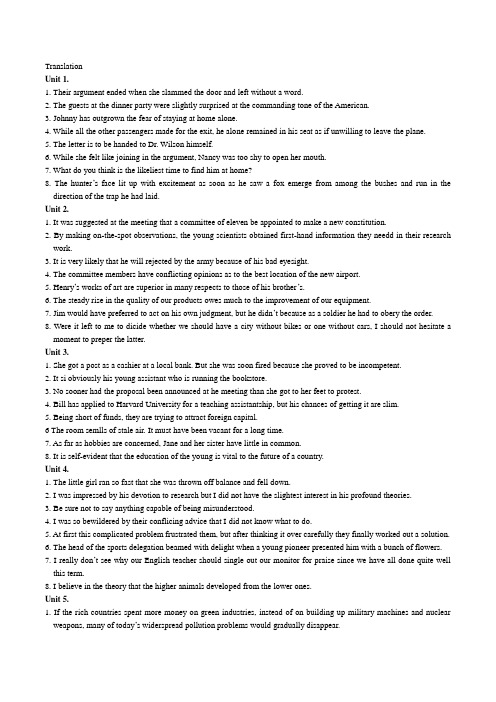
TranslationUnit 1.1. Their argument ended when she slammed the door and left without a word.2. The guests at the dinner party were slightly surprised at the commanding tone of the American.3. Johnny has outgrown the fear of staying at home alone.4. While all the other passengers made for the exit, he alone remained in his seat as if unwilling to leave the plane.5. The letter is to be handed to Dr. Wilson himself.6. While she felt like joining in the argument, Nancy was too shy to open her mouth.7. What do you think is the likeliest time to find him at home?8. The hunter’s face lit up with excitement as soon as he saw a fox emerge from among the bushes and run in the direction of the trap he had laid.Unit 2.1. It was suggested at the meeting that a committee of eleven be appointed to make a new constitution.2. By making on-the-spot observations, the young scientists obtained first-hand information they needd in their research work.3. It is very likely that he will rejected by the army because of his bad eyesight.4. The committee members have conflicting opinions as to the best location of the new airport.5. Henry’s works of art are superior in many respects to those of his brother’s.6. The steady rise in the quality of our products owes much to the improvement of our equipment.7. Jim would have preferred to act on his own judgment, but he didn’t because as a soldier he had to obery the order.8. Were it left to me to dicide whether we should have a city without bikes or one without cars, I should not hesitate a moment to preper the latter.Unit 3.1. She got a post as a cashier at a local bank. But she was soon fired because she proved to be incompetent.2. It si obviously his young assistant who is running the bookstore.3. No sooner had the proposal been announced at he meeting than she got to her feet to protest.4. Bill has applied to Harvard University for a teaching assistantship, but his chances of getting it are slim.5. Being short of funds, they are trying to attract foreign capital.6 The room semlls of stale air. It must have been vacant for a long time.7. As far as hobbies are concerned, Jane and her sister have little in common.8. It is self-evident that the education of the young is vital to the future of a country.Unit 4.1. The little girl ran so fast that she was thrown off balance and fell down.2. I was impressed by his devotion to research but I did not have the slightest interest in his profound theories.3. Be sure not to say anything capable of being misunderstood.4. I was so bewildered by their conflicing advice that I did not know what to do.5. At first this complicated problem frustrated them, but after thinking it over carefully they finally worked out a solution.6. The head of the sports delegation beamed with delight when a young pioneer presented him with a bunch of flowers.7. I really don’t see why our English teacher should single out our monitor for praise since we have all done quite well this term.8. I believe in the theory that the higher animals developed from the lower ones.Unit 5.1. If the rich countries spent more money on green industries, instead of on building up military machines and nuclear weapons, many of today’s widerspread pollution problems would gradually disappear.2. The burning of coal not only consumes the oxygen in the house but also gives out poisonous gases.3. Apparently, finding alternative energy sources is essential to the steady development of our economy.4. Solar cells can absorb sunlight and convert it into electricity.5. If the temperature on the Earth continues to go up from year to year, the polar ice caps will begin to melt and, in all likelihood, half of the buildings in coastal cities will disappear beneath splashing sea waves.6. Because these creatures are small and tend to hide beneath leafy plants, they are not always visible to the naked eye.7. As a result of exposures to atomic radiation, he finally collapsed at work.8. There is distinct evidence of the connection between heavy pressure of work and some disorders of the body.Unit 6.1. As long a you keep on trying, you will be able to resolve this difficult problem sooner or later.2. We anticipate encountering resistance to our plan.( We anticipate that we will encounter resistance to our plan.)3. Jim’s friends said that the noise pollution in their city was terrible, but they had to live with it.4. At first Tom thought that with his knowledge, skill and experience he was bound to find a satisfactory job.5. It would be wise to handle this delicate problem with calmness and patience.6. Dick thought that if he wasn’t able to take the machine apart, chances were that no other worker in the plant could, either.7. Do you think bus drivers should take full responsiblility for the passengers’ safety?8. You needn’t dwell on your mistakes in judgement any more. What’s important is to try your best to avoid repeating them.Unit 7.1. Under the leadership of the local government, the villagers rose to the serious food crisis cause by the floods.2. The exhibition is very popular and is attracting a steady stream of visitors.3. When Mom came upstairs to check on us kids, I turned over and pretended to be asleep.4. Waging a battle against the drug pushers was a challenge to Armstead. She felt rather nervous but she decided to confront them.5. The old lady told me to be cautious and not to talk to the guys hanging out on the street corner.6. A health organization prompted the local government to raise a three-million-dollar fund for a new hospital.7. Opening the door, the man who had set fire to the church found himself confronted by a dozen policemen with guns.8. It is reported that the fire which raged for more than two hours started in an abandoned warehouse.Unit 8.1. Vast amounts of investment have enabled the economy of the area to grow rapidly.2. They lauched a campaign to raise money for a new hospital.3. Success lies in diligence. Dr. Nolen is a case in point.4. Men of high moral standards, they are never to be tempted into taking such expensive gifts.5. There are indications that numerous factories are faced with a very difficult situation.6. The police arrested the criminal on a charge of armed robbery several hours after they found an important clue to his identity.7. Investigation has revealed that retirement tends to cause psychological troubles for some people.8. The medical team did nore than complain about the relatively poor working conditions at the local hospital. For instance, several doctors bought simple medical instruments with their own money.。
大学英语精读3课文(第三版)_中英文对照
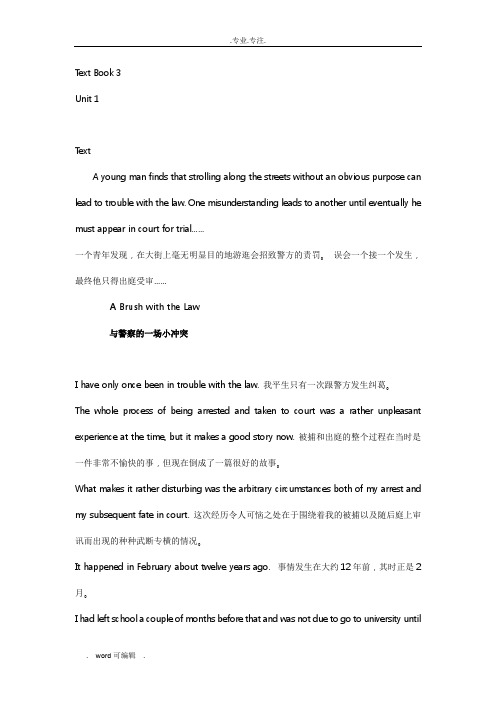
Text Book 3Unit 1TextA young man finds that strolling along the streets without an obvious purpose can lead to trouble with the law. One misunderstanding leads to another until eventually he must appear in court for trial……一个青年发现,在大街上毫无明显目的地游逛会招致警方的责罚。
误会一个接一个发生,最终他只得出庭受审……A Brush with the Law与警察的一场小冲突I have only once been in trouble with the law. 我平生只有一次跟警方发生纠葛。
The whole process of being arrested and taken to court was a rather unpleasant experience at the time, but it makes a good story now. 被捕和出庭的整个过程在当时是一件非常不愉快的事,但现在倒成了一篇很好的故事。
What makes it rather disturbing was the arbitrary circumstances both of my arrest and my subsequent fate in court. 这次经历令人可恼之处在于围绕着我的被捕以及随后庭上审讯而出现的种种武断专横的情况。
It happened in February about twelve years ago. 事情发生在大约12年前,其时正是2月。
I had left school a couple of months before that and was not due to go to university untilthe following October. 几个月前我中学毕业了,但上大学要等到10月。
- 1、下载文档前请自行甄别文档内容的完整性,平台不提供额外的编辑、内容补充、找答案等附加服务。
- 2、"仅部分预览"的文档,不可在线预览部分如存在完整性等问题,可反馈申请退款(可完整预览的文档不适用该条件!)。
- 3、如文档侵犯您的权益,请联系客服反馈,我们会尽快为您处理(人工客服工作时间:9:00-18:30)。
Text Book 3Unit 1TextA young man finds that strolling along the streets without an obvious purpose can lead to trouble with the law. One misunderstanding leads to another until eventually he must appear in court for trial……一个青年发现,在大街上毫无明显目的地游逛会招致警方的责罚。
误会一个接一个发生,最终他只得出庭受审……A Brush with the Law与警察的一场小冲突I have only once been in trouble with the law. 我平生只有一次跟警方发生纠葛。
The whole process of being arrested and taken to court was a rather unpleasant experience at the time, but it makes a good story now. 被捕和出庭的整个过程在当时是一件非常不愉快的事,但现在倒成了一篇很好的故事。
What makes it rather disturbing was the arbitrary circumstances both of my arrest and my subsequent fate in court. 这次经历令人可恼之处在于围绕着我的被捕以及随后庭上审讯而出现的种种武断专横的情况。
It happened in February about twelve years ago. 事情发生在大约12年前,其时正是2月。
I had left school a couple of months before that and was not due to go to university until the following October. 几个月前我中学毕业了,但上大学要等到10月。
I was still living at home at the time. 当时我还在家中居住。
One morning I was in Richmond, a suburb of London near where I lived. 一天早晨,我来到里士满。
这里是伦敦的一个郊区,离我住的地方不远。
I was looking for a temporary job so that I could save up some money to go travelling. 我在寻找一份临时工作,以便积些钱去旅游。
As it was a fine day and I was in no hurry, I was taking my time, looking in shop windows, strolling in the park, and sometimes just stopping and looking around me. 由于天气晴朗,当时又无急事,我便慢悠悠看看橱窗,逛逛公园。
有时干脆停下脚步,四处张望。
It must have been this obvious aimlessness that led to my downfall. 现在看来,一定是这种明显的毫无目的的游逛,使我倒了霉。
It was about half past eleven when it happened. 事情发生在11点半钟光景。
I was just walking out of the local library, having unsuccessfully sought employment there, when I saw a man walking across the road with the obvious intention of talking to me. 我在当地图书馆谋职未成,刚刚走出来,便看到一个人穿越马路,显然是要来跟我说话。
I thought he was going to ask me the time. Instead, he said he was a police officer and he was arresting me. 我以为他要问我时间,不料他说他是警官,要逮捕我。
At first I thought it was some kind of joke. But then another policeman appeared, this time in uniform, and I was left in no doubt. 起先我还以为这是在开玩笑,但又一个警察出现在我的面前,这次是位身着警服的,这一下使我确信无疑了。
'But what for?' I asked. “为什么要抓我?”我问道。
"Wandering with intent to commit an arrestable offence,' he said. “到处游荡,企图作案,”他说。
'What offence?' I asked. “作什么案?”我又问。
'Theft,' he said. “偷窃,”他说。
'Theft of what?' I asked. “偷什么?”我追问。
'Milk bottles,' he said, and with a perfectly straight face too! “牛奶瓶,”他板着面孔说道。
'Oh,' I said. “噢,”我说。
It turned out there had been a lot of petty thefts in the area, particularly that of stealing milk bottles from doorsteps. 事情原来是这样的,在这一地区多次发生小的扒窃案,特别是从门前台阶上偷走牛奶瓶。
Then I made my big mistake. 接着,我犯了一个大错误。
At the time I was nineteen, had long untidy hair, and regarded myself as part of the sixties' 'youth countercultrue. 其时我年方19,留一头蓬乱的长发,自认为是60年代“青年反主流文化”的一员。
As a result, I want to appear cool and unconcerned with the incident, so I said, 'How long have you been following me?' in the most casual and conversational tone I could manage. 所以我想装出一副冷漠的、对这一事件满不在乎的样子。
于是我尽量用一种漫不经心的极其随便的腔调说,“你们跟踪我多久啦?”I thus appeared to them to be quite familiar with this sort of situation, and it confirmed them in their belief that I was a thoroughly disreputable character. 这样一来,在他们眼里,我就像是非常熟悉这一套的了,也使他们更加确信我是一个地地道道的坏蛋。
A few minutes later a police car arrived. 几分钟后,开来了一辆警车。
'Get in the back," they said. 'Put your hands on the back of the front seat and don't move them.' “坐到后面去,”他们说。
“把手放到前排座位的靠背上,不准挪动。
”They got in on either side of me. It wasn't funny any more. 他们分别坐在我的两边。
这可再也不是闹着玩的了。
At the police station they questioned me for several hours. 在警察局,他们审讯了我好几个小时。
I continued to try to look worldly and au fait with the situation. 我继续装成老于世故、对这种事习以为常。
When they asked me what I had been doing, I told them I'd been looking for a job. 当他们问我在干什么时,我告诉他们在找工作。
'Aha,' I could see them thinking, 'unemployed'. “啊,”我可以想象他们在想,“果然是个失业的家伙。
”Eventually, I was officially charged and told to report to Richmond Magistrates' Court the following Monday. Then they let me go. 最后,我被正式起诉,并通知我下周一到里士满地方法庭受审。
随后他们让我离开。
I wanted to conduct my own defence in court, but as soon as my father found out what had happened, he hired a very good solicitor. 我想在法庭上作自我辩护,但父亲知道这事后,马上请了一位高明的律师。
We went along that Monday armed with all kinds of witnesses, including my English teacher from school as a character witness. 我们星期一出庭的时候,带了各种各样的证人,其中包括我中学的英语老师,做我人品的见证人。
But he was never called on to give evidence. My 'trial' didn't get that far. 但结果法庭没有叫他作证。
